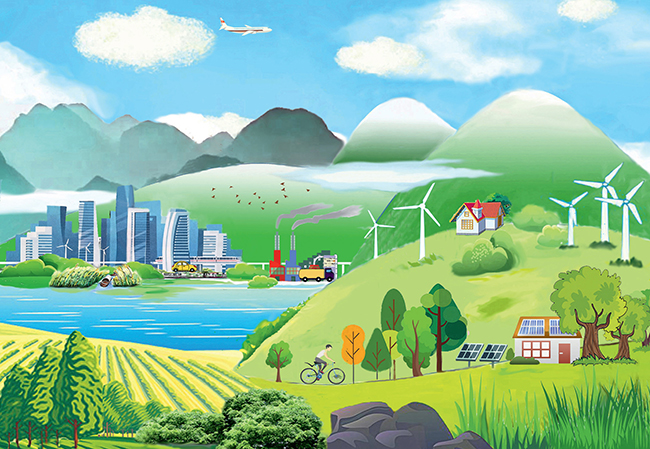

Chinese Journal of Plant Ecology >
Ecological perspectives of carbon neutrality
Received date: 2021-11-02
Accepted date: 2021-11-04
Online published: 2021-11-24
Supported by
National Natural Science Foundation of China for Basic Science Center Project(31988102)
In this article, I first briefly introduce the concept of “Carbon Neutrality”, and then discuss the vital role of ecosystem carbon sinks in achieving the carbon neutrality target. It is assertive that any efforts to achieve the carbon neutrality target depend unavoidably on both reducing carbon emissions and enhancing carbon sequestrations. There are four key factors in reducing carbon emissions, including lowering energy consumption in human activities, restructuring fossil energy consumptions especially decreasing coal consumption, promoting energy use efficiency, and developing clean and low-carbon energy. Enhancing carbon sequestration relies inclusively on restoration, construction, and better management of the ecosystems. Benefited from enhanced vegetation growth and ecological engineering practice, Chinese terrestrial ecosystem has acted and will continue to act the significant role in the carbon sequestration. To improve the ecosystem carbon sequestration, I propose the “three-optimization principles”, i.e., optimal ecosystem arrangement, optimal species setting, and optimal ecosystem management. In addition, I also state some viewpoints on potential problems and challenges in the “post-carbon neutrality” era. It may be crucial to proactively and rationally think about the possibilities of declining global vegetation productivity and relevant new environmental issues caused by a decrease in the CO2 concentration rising in the era.

FANG Jing-Yun . Ecological perspectives of carbon neutrality[J]. Chinese Journal of Plant Ecology, 2021 , 45(11) : 1173 -1176 . DOI: 10.17521/cjpe.2021.0394
| [1] | Crutzen PJ (2006). Albedo enhancement by stratospheric sulfur injections: a contribution to resolve a policy dilemma? Climatic Change, 77, 211-219. |
| [2] | Darby M, Gerretsen I (2019). Which countries have a net zero carbon goal? Climate Home News. [2019-06-16]. https://www.climatechangenews.com/2019/06/14/countries-net-zero-climate-goal/. |
| [3] | Department of Climate Change, National Development & Reform Commission of China (2015). Enhanced Actions on Climate Change: China’s Intended Nationally Determined Contributions. [2015-06-30]. https://www4.unfccc.int/sites/ ndcstaging/PublishedDocuments/China%20First/China% 27s%20First%20NDC%20Submission.pdf. |
| [3] | [中国国家发展和改革委员会应对气候变化司 (2015). 强化应对气候变化行动——中国国家自主贡献. [2015-06-30]. https://www4.unfccc.int/sites/ndcstaging/PublishedDocuments/China%20First/China%27s%20First%20NDC%20Submission.pdf.] |
| [4] | Fang JY, Zhu JL, Yue C, Wang SP, Zheng TL (2018). Carbon Emissions from China and the World. Science Press, Beijing. 240. |
| [4] | [ 方精云, 朱江玲, 岳超, 王少鹏, 郑天立 (2018). 全球及中国碳排放. 科学出版社, 北京. 240.] |
| [5] | Friedlingstein P, O’Sullivan M, Jones MW, Andrew RM, Hauck J, Olsen A, Peters GP, Peters W, Pongratz J, Sitch S, Le Quere C, Canadell JG, Ciais P, Jackson RB, Alin S, et al. (2020). Global carbon budget 2020. Earth System Science Data, 12, 3269-3340. |
| [6] | GCP (Global Carbon Project) (2020). Global carbon budget 2020. [2020-12-12]. https://www.globalcarbonproject.org/carbonbudget/archive.htm#CB2020. |
| [7] | IPCC (2018). Annex I: Glossary (Matthews JBR ed.)//Masson-Delmotte V, Zhai P, Pörtner H-O, Roberts D, Skea J, Shukla PR, Pirani A, Moufouma-Okia W, Péan C, Pidcock R, Connors S, Matthews JBR, Chen Y, Zhou X, Gomis MI, et al. Global Warming of 1.5 °C. An IPCC Special Report on the Impacts of Global Warming of 1.5 °C Above Pre-industrial Levels and Related Global Greenhouse Gas Emission Pathways, in the Context of Strengthening the Global Response to the Threat of Climate Change, Sustainable Development, and Efforts to Eradicate Poverty. World Meteorological Organization, Geneva. 541-562. |
| [8] | IPCC (2021). Climate Change 2021: the Physical Science Basis. Contribution of Working Group I to the Sixth Assessment Report of the Intergovernmental Panel on Climate Change. Cambridge Press, Cambridge, UK. |
| [9] | Keith DW (2000). Geoengineering the climate: history and prospect. Annual Review of Energy and the Environment, 25, 245-284. |
| [10] | The State Council Information Office of the People’s Republic of China (2020). Energy in China’s New Era. People’s Publishing House, Beijing. |
| [10] | [中华人民共和国国务院新闻办公室 (2020). 新时代的中国能源发展. 人民出版社, 北京.] |
| [11] | Zheng TL, Zhu JL, Wang SP, Fang JY (2016). When will China achieve its carbon emission peak? National Science Review, 3, 8-12. |
| [12] | Xi JP (2020). Statement at the general debate of the 75th Session of the United Nations General Assembly. The Gazette of the State Council of the People’s Republic of China, (28), 5-7. |
| [12] | [ 习近平 (2020). 在第七十五届联合国大会一般性辩论上的讲话. 中华人民共和国国务院公报, (28), 5-7.] |
/
| 〈 |
|
〉 |